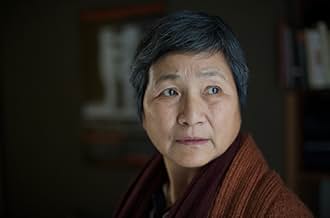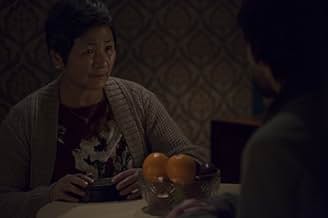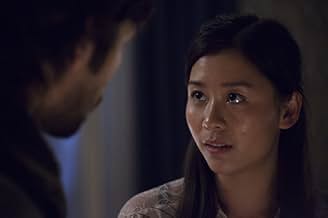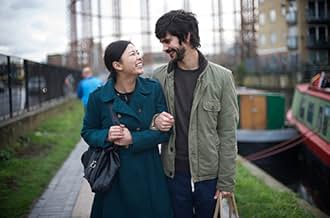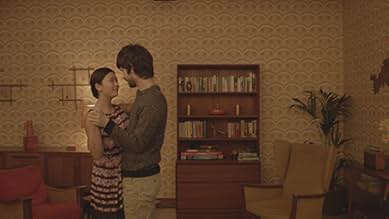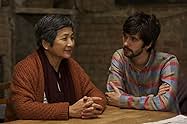Agrega una trama en tu idiomaA young man of French, Chinese, and Cambodian descent dies, leaving behind his isolated mother and his 4-year male lover, who grieve but don't speak a lick of each other's language.A young man of French, Chinese, and Cambodian descent dies, leaving behind his isolated mother and his 4-year male lover, who grieve but don't speak a lick of each other's language.A young man of French, Chinese, and Cambodian descent dies, leaving behind his isolated mother and his 4-year male lover, who grieve but don't speak a lick of each other's language.
- Dirección
- Guionista
- Elenco
- Nominada a1 premio BAFTA
- 4 premios ganados y 7 nominaciones en total
- Junn
- (as Cheng Pei Pei)
- Vann
- (as Naomi Christie)
- Waiter
- (sin créditos)
- Cafe customer
- (sin créditos)
- Elderly Resident
- (sin créditos)
- Café Customer
- (sin créditos)
- Dirección
- Guionista
- Todo el elenco y el equipo
- Producción, taquilla y más en IMDbPro
Opiniones destacadas
The movie has a really good start, but after halfway through, the Director/Writer loses his way; it seemed as if he's not sure as to where to take the story. By the time it ended, I felt dissatisfied; the story should have been longer or the characters should have been explored and developed a little more.
The two leads, Ben Whishaw and Pei-pei Cheng, give quite strong and incredible performances; they have a few immensely moving scenes. And it doesn't hurt that Andrew Leung, the actor playing the deceased partner, is quite handsome; he and Ben looked quite good together, which makes his death even more painful.
The conversations the two lead characters share are quite moving and thought-provoking, and the monologue Junn has towards the end on the essence of grief and crying is really beautiful. Let me quote the most effective lines from it: "These memories are all I have; I need to keep them vivid, or they'll fade like the face of my husband. I want to dwell on these memories and cry over them because they comfort me. Through plenty of crying, I've learnt to be content that I won't always be happy, secure in my loneliness, hopeful that I'll be able to cope."
The movie is depressing, yet uplifting, but somehow I feel, it failed to reach its true potential.
In many Wong Kar Wai films the actors speak to each other in different languages with seeming full understanding. It suggests a disjuncture between time, place and culture, where language, usually the unifying factor within the narrative, becomes the source of each character's isolation. Lilting is self-conscious in its language play and it works powerfully to both comic and emotional effect. This has the magic effect of bending time. Locations are practically sparse, but the film gives the feeling of having moved us quite literally around the world.
The film demonstrates that with translation, there is always something essential that is lost. This might be cultural sensitivity, the feeling that we understand when, actually, we do not. Thus, it questions the assumptions we all make. It might also be the feeling that we know something or someone when actually we do not.
This may sound a heady, difficult mix. Far from it.
The film is beautifully shot, and again we experience something of the camera work of Christopher Doyle (Wong Kar Wai's leading cinematographer) in the delicate and soft palate of colours, and subtlety of framing which are as evocative as the language play in evoking mood and location. Nothing is wasted in this film. Even landmark pieces of music (another Wong motif) sit perfectly within the cross cultural narrative.
This is a film I will watch again and not simply for the references to Wong Kar Wai, It's a seamless depiction of loss in a world of seeming falling borders.
I hope you enjoy the film as much as I have.
Perfectly clear throughout the whole running time is that Junn and Richard belong to two different worlds. There is much more than merely a language barrier that withholds them from really communicating. The interpreter he hired, Vann, dismisses Junn's lack of knowledge of the English language, calling her a "lazy bitch" which was obviously a common phenomenon under female immigrants. On one hand they could depend on their spouse or children to interface with the outer world, and on the other hand it demonstrates Junn's bland refusal to adapt to the world where she lived in for many years. That also explains how the English way to take care of the elderly, being very different from her own traditions, stood between Junn and Kai for a long time, in spite of Kai repeatedly saying that the home for the elderly she was put in, was just a "temporary" measure. Anyway, Kai did not have to cope with a language barrier, and still failed to drive the message home, particularly as he kept postponing a decision to explain the real relationship between himself and Richard, fearing she would not understand and working disruptively on the relationship between mother and son.
A nice find is the introduction of Alan as Junn's would-be lover. They "dated" several times before, both without understanding a word what the other was saying. This courting formed an excuse for Richard to hire Vann as an interpreter, fitting nicely his own hidden agenda to come closer to Junn. The relationship between Alan and Junn changes as soon as their communication improved. It brings several differences to light, some not so important but others seemingly insurmountable. Junn is not the modest passive woman we assumed at first sight; she can make her position very clear when felt necessary.
The final scene demonstrates hope for their future. Junn and Richard seem to be able to communicate without interpreter Vann translating each sentence (this is rather implicit, but even I understood by virtue of their body language). We see a mutual trust and understanding growing between the two when exchanging sentences, in spite of not really knowing what the other was saying. I must admit being a bit lost during this final scene. It took some time on the way home to grasp all the things that were shown implicitly. The preceding scenes were abundantly clear in comparison, but this one needed some afterthought. We can imagine for ourselves how their relationship is about to continue, this being left as an exercise for the viewer.
¿Sabías que…?
- TriviaFilmed in 3 weeks.
- ErroresAt the scene when Ben Whishaw and Andrew Leung were on bed, Ben says "You're really gonna do that?", but his lips don't move.
- Citas
Junn: Through plenty of crying, I've learnt to be content that I won't always be happy, secure in my loneliness, hopeful that I will be able to cope. Every year on Christmas Day I get very lonely. An incredible feeling of solitude. On this day, everything has stood still, even the trees have stopped rustling, but I'm still moving, I want to move, but I have nothing to move to, and nowhere to go. The scars beneath my skin suddenly surface and I get scared. Scared of being alone.
- ConexionesFeatured in Lilting: Deleted Scene (2014)
- Bandas sonorasYe Lai Xiang
Performed by Xiang Lan Li
Selecciones populares
- How long is Lilting?Con tecnología de Alexa
Detalles
- Fecha de lanzamiento
- País de origen
- Sitio oficial
- Idiomas
- También se conoce como
- Sevgilinin Ardından
- Locaciones de filmación
- Productoras
- Ver más créditos de la compañía en IMDbPro
Taquilla
- Total en EE. UU. y Canadá
- USD 27,054
- Fin de semana de estreno en EE. UU. y Canadá
- USD 1,567
- 28 sep 2014
- Total a nivel mundial
- USD 247,377
- Tiempo de ejecución1 hora 23 minutos
- Color
- Relación de aspecto
- 2.35 : 1
Contribuir a esta página









